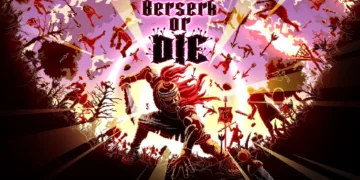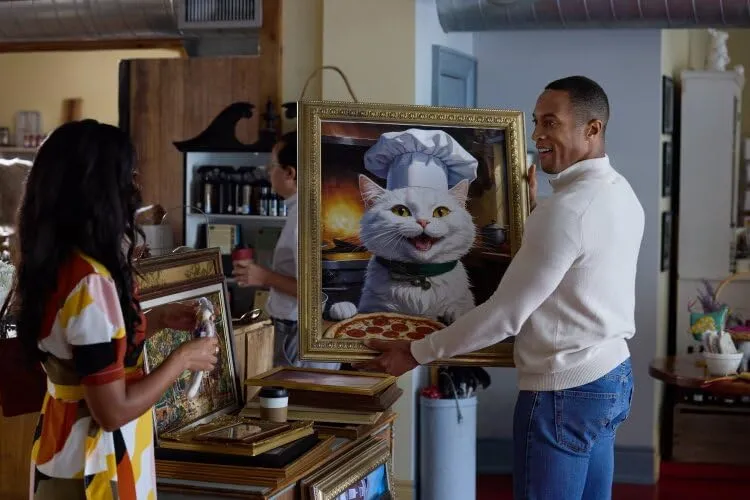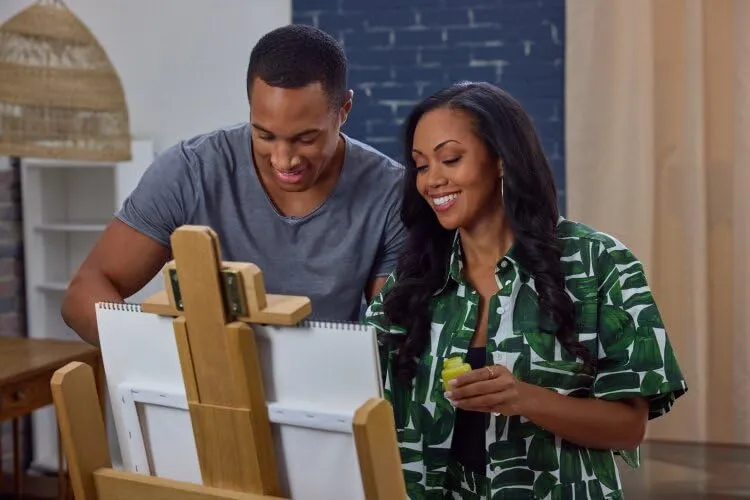“Hearts Around The Table: Shari’s Second Act” arrives as another installment in a series that, much like a well-loved family recipe, offers familiar comfort. The premise orbits a charmingly modern concept: a group of adult foster siblings, their bonds forged not by blood but by shared experience, gathering weekly around their foster mother’s table.
This particular story turns its lens on Shari Adams, a portrait artist whose life has just been through the emotional wringer of a divorce. She returns to Washington D.C., not just to lick her wounds, but to actively repaint her future. The film opens with her securing an artist’s residency – a literal and figurative new space.
It’s a classic setup for a tale of rebirth, placing Shari back into the embrace of her steadfastly supportive, if unconventional, family, a warm counterpoint to the uncertainties of her new beginning. I’m always drawn to stories about fresh starts; there’s an inherent optimism in watching someone pick up the pieces and try to make something new.
Brushstrokes of Healing: Finding Inspiration After the Fall
Shari’s identity as a portrait painter is central, and her artistic journey is meant to mirror her internal one. She settles into the artist co-op, a space that, from what the film shows, feels less like a bustling creative hub and more like a quiet refuge, primarily occupied by her and its handsome owner.
A significant commission lands in her lap, an opportunity that should be a professional triumph. Yet, Shari’s creative energy seems elusive. The film touches upon the age-old struggle for inspiration, particularly when life throws you a curveball. Does she dive into the commission?
Or does her muse lead her elsewhere – perhaps to capturing the likeness of those now shaping her new chapter, or even turning the canvas inward for a series of self-portraits? It’s a relatable depiction of how personal turmoil can redirect professional focus. We see her grapple, and her art becomes a quiet barometer of her healing.
There’s a gentle nod here to the experience of Evan’s grandmother, Lindsay, a painter who let her dreams fade, a subtle caution woven into Shari’s narrative tapestry. The camera work, in these moments of artistic contemplation, tends towards a soft, reflective style, letting Shari’s expressions tell much of the story.
The Architecture of Affection: Building Romance on Freshly Laid Foundations
The romantic thread introduces Evan James, the proprietor of the artist co-op. Their connection begins with the tentative steps typical of the genre. Shari’s apprehension is understandable; fresh from a divorce, the thought of a new relationship is both appealing and daunting.
The film maps out their interactions with a rhythm of approach and retreat – moments of genuine connection punctuated by misunderstandings and the classic “I need space” trope. Evan, with his own quiet ambitions, particularly his dedication to his grandmother and her lost artistic legacy, provides a grounding presence.
Their shared quest for one of Lindsay’s paintings, and later, the dilemma posed by Evan’s potential job offer in San Francisco, are narrative devices designed to test their nascent bond. The film presents their romance with a certain earnestness, though the spark feels more like a gentle warmth than a roaring fire.
This careful pacing, often a hallmark of such movies, invites reflection on how trust is rebuilt after a significant emotional blow, and how one’s personal healing journey dictates the tempo of new attachments. It reminds me of so many classic screen romances where external obstacles mirror internal hesitations.
The Sunday Dinner Sanctuary: Chosen Family and Quiet Truths
The true anchor of “Shari’s Second Act” is the depiction of her foster family. Angie, the foster mother, is the quintessential matriarch, her home a haven, and the weekly Sunday dinners a ritual of solidarity. These scenes, filled with the easy chatter and unspoken understanding between Shari and her siblings Jenna, Kiki, Josh, and Rory, are the film’s most resonant.
Each sibling carries their own burdens, hinted at just enough to underscore the film’s message: this is a community that shows up for each other. The film champions the idea of second chances and the profound strength derived from a reliable support system. Lindsay’s story, too, serves as a quiet reminder to cherish and pursue one’s passions.
Shari’s eventual introduction of Evan to this tight-knit circle, terming him her “best friend, muse, and soulmate” – perhaps a little swift, but heartfelt – signifies her readiness to weave new threads into her life’s fabric. The film doesn’t offer grand dramatic flourishes; its power lies in its gentle portrayal of resilience and the enduring comfort of belonging, a cinematic equivalent of a warm hug on a difficult day.
Full Credits
Director: Marco Deufemia
Writer: Neale Kimmel
Producers: Jessica Reis, Donald Teuma-Castelletti, Peter Durst
Executive Producers: Beth Stevenson, Stan Hum, Nancy Yeaman
Cast: Mishael Morgan, Brendan Morgan, Mindy Cohn, Ashley Newbrough, Jake Epstein, Kathryn Davis, Justice James, Darlene Cooke, Gage Graham-Arbuthnot, Brian Cook, Eddie Bizarria, Nathan Stephenson, Maya Camastro, Nicolas Grimes
Director of Photography (Cinematographer): Aldo Quirván
Editor: Navin Ramaswaran
Composers: Stephen Krecklo, Sean Nimmons-Paterson
The Review
Hearts Around the Table: Shari's Second Act
"Hearts Around The Table: Shari’s Second Act" offers a gentle, if predictable, narrative of healing and new beginnings. Its strength lies in the warm portrayal of a supportive chosen family and its quiet exploration of finding one's footing after life changes. While the romantic and artistic plotlines tread familiar ground with a soft touch, the film serves as a comforting, undemanding watch, resonating more through its heartfelt themes of resilience and belonging than through any bold cinematic strokes. It’s a cinematic warm blanket, earnest in its depiction of life’s quieter reconstructions.
PROS
- Warm portrayal of supportive family bonds.
- Themes of resilience and starting anew.
- Comforting and gentle atmosphere.
CONS
- Familiar romantic progression.
- Artistic journey feels somewhat underexplored.
- Low on narrative surprises or high stakes.


















































